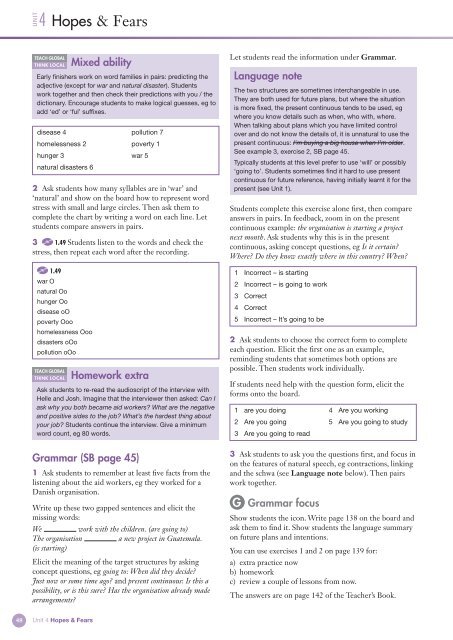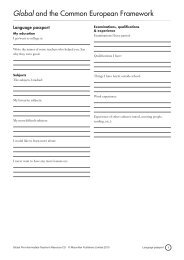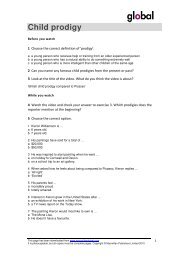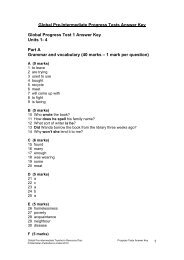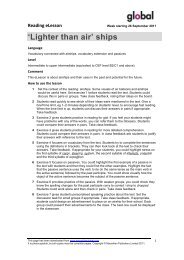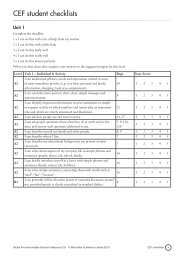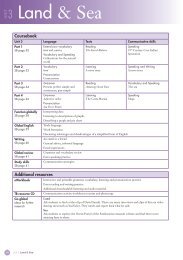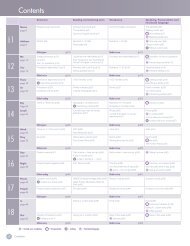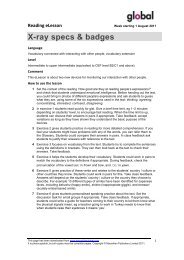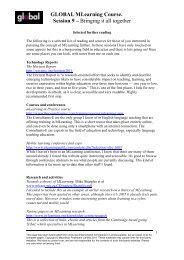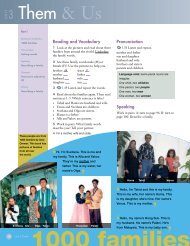Teacher's Book teaching notes - Global
Teacher's Book teaching notes - Global
Teacher's Book teaching notes - Global
You also want an ePaper? Increase the reach of your titles
YUMPU automatically turns print PDFs into web optimized ePapers that Google loves.
UNIT4Hopes & FearsTEACH globalThink localMixed abilityEarly finishers work on word families in pairs: predicting theadjective (except for war and natural disaster). Studentswork together and then check their predictions with you / thedictionary. Encourage students to make logical guesses, eg toadd ‘ed’ or ‘ful’ suffixes.disease 4homelessness 2hunger 3natural disasters 6pollution 7poverty 1war 52 Ask students how many syllables are in ‘war’ and‘natural’ and show on the board how to represent wordstress with small and large circles. Then ask them tocomplete the chart by writing a word on each line. Letstudents compare answers in pairs.3 1.49 Students listen to the words and check thestress, then repeat each word after the recording.1.49war Onatural Oohunger Oodisease oOpoverty Ooohomelessness Ooodisasters oOopollution oOoTEACH globalThink localHomework extraAsk students to re-read the audioscript of the interview withHelle and Josh. Imagine that the interviewer then asked: Can Iask why you both became aid workers? What are the negativeand positive sides to the job? What’s the hardest thing aboutyour job? Students continue the interview. Give a minimumword count, eg 80 words.Grammar (SB page 45)1 Ask students to remember at least five facts from thelistening about the aid workers, eg they worked for aDanish organisation.Write up these two gapped sentences and elicit themissing words:We work with the children. (are going to)The organisation a new project in Guatemala.(is starting)Elicit the meaning of the target structures by askingconcept questions, eg going to: When did they decide?Just now or some time ago? and present continuous: Is this apossibility, or is this sure? Has the organisation already madearrangements?Let students read the information under Grammar.Language noteThe two structures are sometimes interchangeable in use.They are both used for future plans, but where the situationis more fixed, the present continuous tends to be used, egwhere you know details such as when, who with, where.When talking about plans which you have limited controlover and do not know the details of, it is unnatural to use thepresent continuous: I’m buying a big house when I’m older.See example 3, exercise 2, SB page 45.Typically students at this level prefer to use ‘will’ or possibly‘going to’. Students sometimes find it hard to use presentcontinuous for future reference, having initially learnt it for thepresent (see Unit 1).Students complete this exercise alone first, then compareanswers in pairs. In feedback, zoom in on the presentcontinuous example: the organisation is starting a projectnext month. Ask students why this is in the presentcontinuous, asking concept questions, eg Is it certain?Where? Do they know exactly where in this country? When?1 Incorrect – is starting2 Incorrect – is going to work3 Correct4 Correct5 Incorrect – It’s going to be2 Ask students to choose the correct form to completeeach question. Elicit the first one as an example,reminding students that sometimes both options arepossible. Then students work individually.If students need help with the question form, elicit theforms onto the board.1 are you doing2 Are you going3 Are you going to read4 Are you working5 Are you going to study3 Ask students to ask you the questions first, and focus inon the features of natural speech, eg contractions, linkingand the schwa (see Language note below). Then pairswork together.G Grammar focusShow students the icon. Write page 138 on the board andask them to find it. Show students the language summaryon future plans and intentions.You can use exercises 1 and 2 on page 139 for:a) extra practice nowb) homeworkc) review a couple of lessons from now.The answers are on page 142 of the Teacher’s <strong>Book</strong>.48Unit 4 Hopes & Fears


